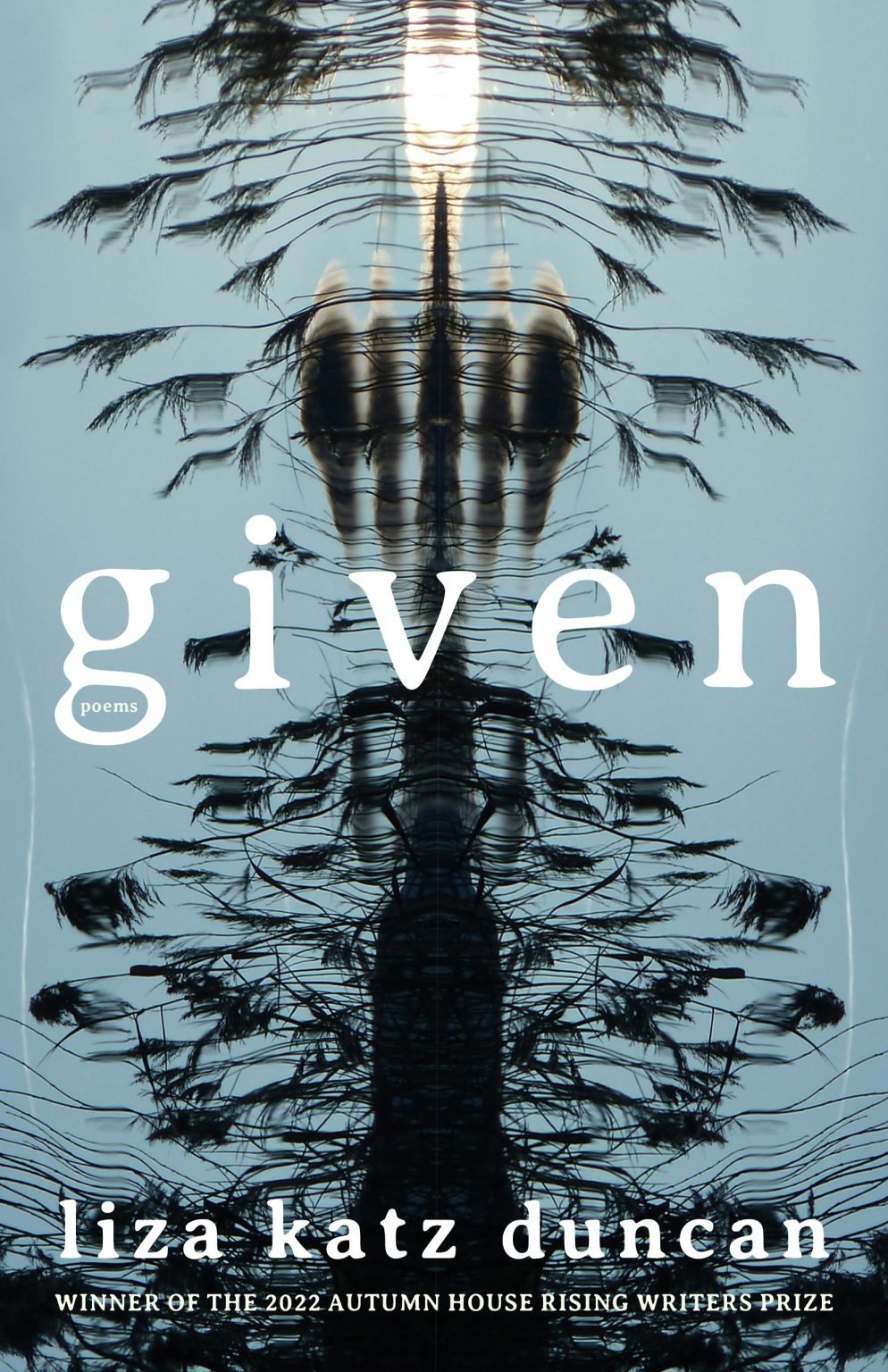Drought/Diagnosis
Given is the record of a haunting, a clear-eyed love song to the notion of home, a frame stilled on the highwater mark after the flood. Through finely wrought lyric poems that swell and break with movement, Liza Katz Duncan articulates the speaker’s longing for family and place “despite the dying world.” Indeed, the world of Given grapples with a precarious future: hurricanes Sandy and Irene loom large in the town’s memory, and the present, where the “seasons unseason,” are marked by mass die-offs and the threat of subsummation. And just as the world reckons with the catastrophes of the Anthropocene, so too does the speaker attend to staggering personal loss. Yet the collection trembles with a skeptical but persistent hope. Duncan shows us the town she chooses, though “neighbors head inland, leaving the keys in the door.” Here the bay, the uncles; there the Wawa, the “streets with names that were self-explanatory: Harbor Way. Shore Concourse.” The speaker asks, “What if my body is not an apocalypse?” Asks, “What if my body is not a misunderstanding with the changing earth?” Given argues, granularly, tenderly, that home and place are worth remembering, worth returning to, that roots, however ephemeral, can ground us in the swirling tides of grief.
—Donika Kelly, author of The Renunciations
Liza Katz Duncan’s Given testifies to the luminous terror of creation: “the sky makes and remakes.” Then: “I had to write myself back into this place, if only to watch it fall apart.” There is so much here being made and unmade: personal griefs decimated by ecology, ecologies decimated by personal loss. I don’t know that I’ve ever seen a poet do what Liza Katz Duncan does here, testifying to loss and endurance this way, in such a radiant braid.
—Kaveh Akbar, author of Pilgrim Bell
Given by Liza Katz Duncan is one of the strongest debuts I’ve read in a long time. In an age where market and media forces encourage us to silo our griefs, Given makes the necessary argument that our losses intersect and inform one another: from the loss of a child to the loss of a home, a town, a shoreline, a way of living. The poems are emotionally moving and impressive in formal range, from short lyrics to longer sectioned sequences, incantatory litanies to poems in received forms. In Given, Duncan brings home the lived ramifications of dailiness in an age of ecological peril. The book is a necessary addition to our developing libraries of eco-poetry and docu-poetry and poetry period—Given is a must-read.
—Dana Levin, author of Now Do You Know Where You Are
Paradox is everywhere in Liza Katz Duncan’s beautiful collection, Given. It is the paradox of what is both given and ungiven, built and unbuilt, destroyed and enduring. And rightly so. What else but paradox is it to endure and survive a crushing loss, a cataclysmic superstorm and to create from it a book of such beauty and emotional power?
—Kathy Nelson, The Adroit Journal
“You’d have to be crazy to call home / a strip of sand that will be underwater in fifty years,” Liza Katz Duncan writes in the opening poem of her gripping debut collection, Given. “My God,” the poem continues, “what does that make me?” These are poems of deep tenderness, connection, attention, and despair. These poems, written in the long shadow of Superstorm Sandy, describe personal, communal, and global catastrophes. I waded through them as one might wade through the aftermath of a hurricane, finding evidence of love and grief, and, also, importantly, persistent hope.
—Camille Dungy, Orion Magazine
Liza Katz Duncan’s Given addresses the voids which increasingly seem to define our 21st century.
— Benjamin Landry, VerseCurious
Liza Katz Duncan’s debut collection, Given, winner of the Autumn House Rising Writer Prize, is both a poignant elegy and a sustained meditation integrating reflections on aesthetic perception and the complex interdependence between nature and psyche with deepening mourning of tragedies personal and collective. Its thematic scope allows insights from each context to inform the others, and its variety of approaches offers continued revisioning of and movement of thought and feeling within its central concerns. A considered inner strength permeates the poems, a forthright balance of reflective thought, awareness of emotional nuance, and an intuitive sense of connection between inner and outer, perception and lacuna, love and loss.
— Michael Collins, North of Oxford

